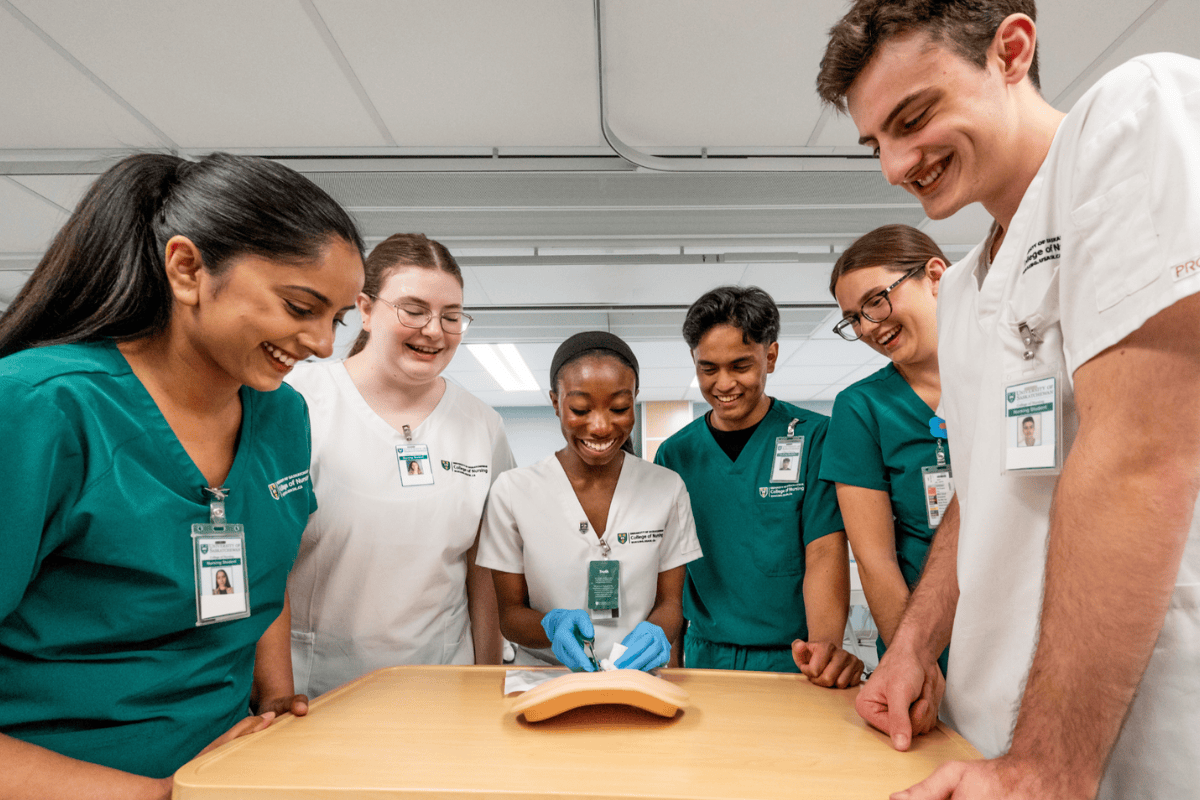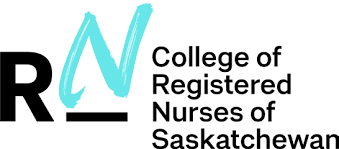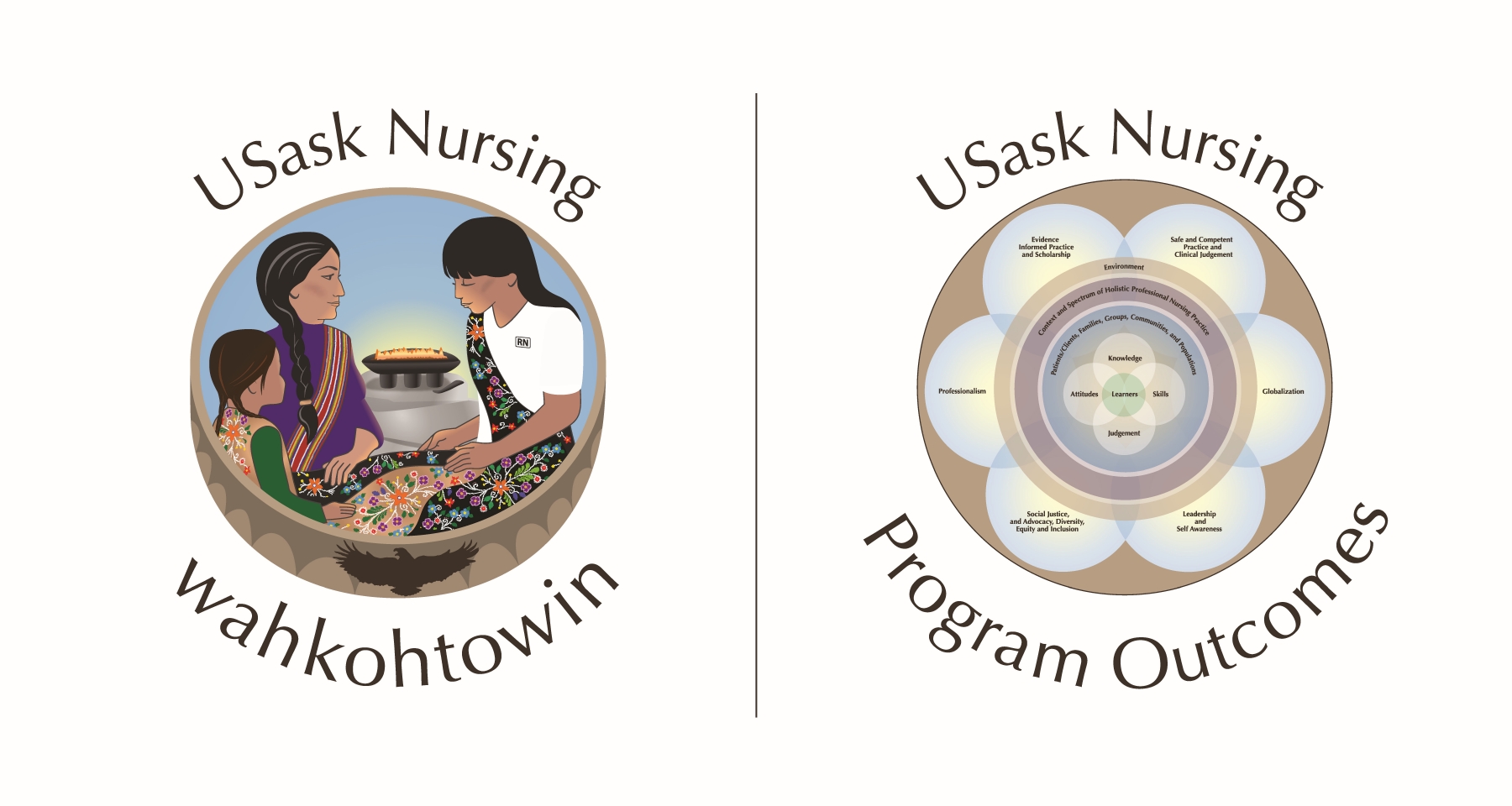Post-Degree Bachelor of Science in Nursing
The College of Nursing has made the decision to put a hold on applications for the Winter 2027 intake of the Post-Degree Bachelor of Science in Nursing (PDBSN) program. Additional information regarding admissions, application timelines, and next steps will be communicated on the USask PDBSN Admissions Website as soon as they are available. We encourage you to check back regularly for the most up to date information.
Program Overview

The purpose of the Post-Degree Bachelor of Science in Nursing (PDBSN) option is to recognize previous university achievements of qualified students and give them the opportunity to earn a Bachelor of Science in Nursing (BSN) degree in a shortened period of time. It is available to students who have completed a baccalaureate degree, or have made significant progress toward a degree in another field.
The option provides opportunity for full-time intensive study over six consecutive terms with program completion in less than two calendar years. Students graduate with a Bachelor of Science in Nursing (BSN) from the University of Saskatchewan. The PDBSN program must be completed at the Saskatoon Campus.
To become eligible for licensure with the College of Registered Nurses of Saskatchewan (CRNS), graduates must pass the National Council Licensure Examination (NCLEX) administered by Pearson VUE and pay the required fees.
Admission
Requirements
Admission is competitive and based on academic and non-academic requirements.
Course
Organization
The PDBSN option offers full-time study over six terms.
Program
Requirements
Explore the requirements students must fulfill for the PDBSN program.
Graduates will meet the entry-level competencies of the professional regulatory body, the College of Registered Nurses of Saskatchewan (CRNS) and the Canadian Association of Schools of Nursing (CASN). Graduates will be eligible to write the National Council Licensure Examination (NCLEX).
Graduates of our program contribute to the scholarship of the nursing profession. The Canadian Association of Schools of Nursing (CASN) defines scholarship as "a full range of intellectual and creative activities that may include the generation, validation, synthesis and/or application of knowledge to advance the teaching, research, and practice of nursing," (CASN, 2001). Unique to a practice discipline, such as nursing, CASN expects educational programs address the scholarship of service thus requiring graduates to use their specialized knowledge and experience outside the work setting to shape and advance the profession and its values, and contribute to social efforts that benefit humans and society (CASN).
Upon completion of their degree, graduates with a Bachelor of Science in Nursing (BSN) are expected to function as generalists in a variety of practice settings, in partnership with individuals, families, groups, and communities. They will provide safe, competent, quality care in accordance with the standards of professional practice. Consistent with CASN's expectations for scholarship in a practice discipline, graduates will demonstrate a strong sense of confidence, passion, and an attitude of curiosity for the profession and the practice of nursing. Graduates will enter a knowledge intensive environment of health care and service delivery. Our program will position them to work collaboratively within an interprofessional team and to contribute to health maintenance by their ability to use critical thinking, reflection, analysis, and synthesis for evidence-informed practice. Graduates will be accountable for professional behaviour as guided by the Canadian Nurses Association's Code of Ethics and CRNS provincial regulatory competencies and standards. At the time of graduation, students will be able to articulate a clear sense of the professional nursing role and scope of practice.
The College of Nursing values integrity, social justice, unconditional positive regard, and achieving potential. These values are inherent in our teaching and programs of research. Learning occurs within an environment where faculty demonstrate our beliefs of "being open and honest, in keeping our commitments, in taking responsibility for our lives and learning, and in operating in a transparent manner.” Students are taught the "value of human life, the inherent worth of the individual, the right of each individual to the attainment of a high standard of health, and will work with communities to achieve these rights and that each person has a right to be treated with respect regardless of his or her life circumstances or culture." The BSN is the beginning stage in achieving potential. Our faculty members share with CASN the understanding of scholarship of application as a means to maintain competencies throughout one's career. Graduates understand nursing as a profession requires "life-long learning, risk taking, and advancing one's knowledge base leads the way for empowerment," (College of Nursing, 2008). Graduates are taught that leadership is a fundamental competency for nursing practice. Exhibiting qualities of leadership in the delivery of care, in both formal and informal roles, and an ability to be comfortable with uncertainty and change are expected competencies.
The BSN nursing curriculum is designed for students to progress from understanding basic nursing approaches, to demonstrating sound clinical judgement in a variety of situations. Each term, nursing practice will solidify learning and increase confidence in students. In addition to theory courses, students will have the opportunity to participate in interprofessional learning activities, simulation, and clinical practice. This combination of instruction and experience will aid in the completion of the program objectives for each year.
The College of Nursing works in partnership with experts in disciplines such as pharmacy and microbiology, to ensure the highest quality of instruction. Students will be taught these specialized courses by faculty in the respective colleges, through the lens of nursing. The sequence of learning is such that students will first obtain theoretical knowledge, practice skills in a simulated environment, and solidify knowledge through clinical practice. Knowledge is scaffolded each year, providing a rich learning experience in multiple learning environments.
Curriculum Model
The University of Saskatchewan nursing graduate will be competent in the program outcomes illustrated in USask Nursing Curriculum model, and will be introduced to First Nations, Metis, and Inuit worldviews through the wahkohtowin model.
Wahkohtowin, a Cree Worldview, describes how we are all related and interconnected, and how the energy in the relationships can create transformation. The wahkohtowin symbol, gifted to the College of Nursing, is rich with images that capture cultural concepts representing First Nation, Metis, and Inuit people.
The Inuit peoples are represented by the Qulliq, Metis peoples are represented by the sash and beadwork, and First Nations peoples are also represented by the beadwork, and the drum. Overarching cultural images include: family, Father Sky, circle of life and Mother Earth’s heartbeat, fire, rocks, and the Eagle, which as one of the Seven Sacred Teachings, represents love.
The Seven Sacred Teachings are values that when embodied will promote harmony and a good life.
The Cree worldview of wahkohtowin was intentionally chosen by the College of Nursing. According to the 2021 census, there are approximately 130,000 people (12% of the population) in Saskatchewan who belong to one of the 70 First Nations. The most common First Nation linguistic groups spoken in Saskatchewan are Cree (an Algonquin language), Dakota, Dene, Nakota (Assiniboine), and Saulteaux. Additionally, Saskatchewan has a prominent Metis population (5%), making Michif another significant regional language. Of these languages, Cree is most prevalent, with over 24,600 speakers in Saskatchewan.
The USask Nursing curriculum model illustrates four layers of the nursing experience represented as circular rings. The inner ring represents the individual learner. The learner will be provided with a holistic learning experience including the physical, emotional, mental, and spiritual realms. Learners will practice skills with respect, kindness and vision, they will exude honesty in their attitudes, demonstrate clinical judgement with a sense of responsibility, and value intuition, reflection, humility, wisdom, self-awareness, and experience in acquiring new knowledge.
The second ring represents the recipients of care, such as individual patients/clients, groups, families, communities, or entire populations. The third ring represents the context of holistic nursing practice, and the fourth and outer ring represents the societal environments where nursing practice occurs.
The six program outcomes represented in the outer circles of the USask Nursing curriculum model are:
- Leadership and Self Awareness
- Social Justice and Advocacy, Diversity, Equity and Inclusion
- Evidence Informed Practice and Scholarship
- Globalization
- Professionalism
- Safe and Competent Practice and Clinical Judgement
The seventh program outcome introduces students to the worldview of wahkohtowin and encourages students to apply these teachings to their practice.
The College of Nursing acknowledges that Western and traditional worldviews may contradict each other. The intent of the college is to challenge learners to consider multiple worldviews simultaneously, and to seek harmony and wellness through good relations with each other and those we serve.




